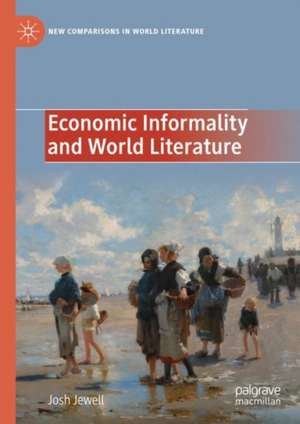Economic Informality and World Literature: New Comparisons in World Literature
Autor Josh Jewellen Limba Engleză Hardback – 30 apr 2024
Din seria New Comparisons in World Literature
- 15%
 Preț: 695.85 lei
Preț: 695.85 lei - 15%
 Preț: 697.32 lei
Preț: 697.32 lei - 8%
 Preț: 442.30 lei
Preț: 442.30 lei - 15%
 Preț: 584.10 lei
Preț: 584.10 lei - 15%
 Preț: 697.47 lei
Preț: 697.47 lei - 15%
 Preț: 636.76 lei
Preț: 636.76 lei - 15%
 Preț: 697.47 lei
Preț: 697.47 lei - 15%
 Preț: 585.40 lei
Preț: 585.40 lei - 9%
 Preț: 756.03 lei
Preț: 756.03 lei - 15%
 Preț: 529.28 lei
Preț: 529.28 lei - 15%
 Preț: 699.45 lei
Preț: 699.45 lei - 15%
 Preț: 498.79 lei
Preț: 498.79 lei -
 Preț: 386.99 lei
Preț: 386.99 lei - 15%
 Preț: 525.20 lei
Preț: 525.20 lei - 15%
 Preț: 579.84 lei
Preț: 579.84 lei -
 Preț: 383.12 lei
Preț: 383.12 lei -
 Preț: 388.52 lei
Preț: 388.52 lei - 18%
 Preț: 892.28 lei
Preț: 892.28 lei - 15%
 Preț: 639.08 lei
Preț: 639.08 lei - 15%
 Preț: 690.44 lei
Preț: 690.44 lei - 15%
 Preț: 697.32 lei
Preț: 697.32 lei - 15%
 Preț: 697.32 lei
Preț: 697.32 lei - 15%
 Preț: 699.77 lei
Preț: 699.77 lei -
 Preț: 357.49 lei
Preț: 357.49 lei
Preț: 697.65 lei
Preț vechi: 820.76 lei
-15% Nou
Puncte Express: 1046
Preț estimativ în valută:
133.49€ • 139.38$ • 110.48£
133.49€ • 139.38$ • 110.48£
Carte tipărită la comandă
Livrare economică 04-18 aprilie
Preluare comenzi: 021 569.72.76
Specificații
ISBN-13: 9783031531330
ISBN-10: 3031531337
Ilustrații: VIII, 234 p.
Dimensiuni: 148 x 210 mm
Greutate: 0.44 kg
Ediția:2024
Editura: Springer Nature Switzerland
Colecția Palgrave Macmillan
Seria New Comparisons in World Literature
Locul publicării:Cham, Switzerland
ISBN-10: 3031531337
Ilustrații: VIII, 234 p.
Dimensiuni: 148 x 210 mm
Greutate: 0.44 kg
Ediția:2024
Editura: Springer Nature Switzerland
Colecția Palgrave Macmillan
Seria New Comparisons in World Literature
Locul publicării:Cham, Switzerland
Cuprins
Chapter 1- From Malandros to Agregados:the Precarious Labourer and the Novel Form in 19th Century Brazil.- Chapter 2-Sex Work in Caribbean Fiction.- Chapter 3 Economic Informality in South African Fiction.- Chapter 4 -(In) formal structure in Wizard of the Crow.- Chapter 5-Precarious Core.
Notă biografică
Josh Jewell is a resident scholar in the Humanities Institute at University College Dublin, Ireland. His research analyses the relationship between labour and literary form in world-literature. His current postdoctoral research project focuses on representations of labour which falls outside of direct market mediation--such as domestic labour and peasant agriculture--in South Africa, Brazil, the Caribbean, and the European periphery.
Textul de pe ultima copertă
This book analyses the impact of economic informality on the novel form across the modern world-system, looking specifically at works by Antonio de Almeida, Machado de Assis, Dany Laferrière, Ngũgĩ wa Thiong’o, Nadine Gordimer, and Masande Ntshanga. It sees the representation of informal economies as a structural homology of world-literature. In chapters on the figure of the agregado in the nineteenth-century Brazilian novel; sex work in Haitian fiction; the politics of the informal economy in the post-apartheid South African novel; and Ngugi’s representation African occult economies, Josh Jewell explores the relationship between the rise of improvised economic activity—and its consolidation under neoliberalism in postcolonial nations—and literary form. He shows how informal economies can be grasped as locations of strategy and improvisation whose subjects must shift constantly between officialdom and underground networks; between the realms of the licit and illicit. This produces highly heterogenous narratives oscillating between different tones and registers (unserious and tragic), social spaces (working-class and elite), and conceptions of reality. By comparing the various situated aesthetics of informality, this book instrumentalises the Warwick Research Collective’s compelling but nebulous idea of a world-literature that “variously registers” a “singular modernity”.
Josh Jewell is a resident scholar in the Humanities Institute at University College Dublin, Ireland. His research analyses the relationship between labour and literary form in world-literature. His current postdoctoral research project focuses on representations of labour which falls outside of direct market mediation--such as domestic labour and peasant agriculture--in South Africa, Brazil, the Caribbean, and the European periphery.
Caracteristici
Investigates the registration of economic informality in literature, and specifically in the novel Examines case-studies from nineteenth-century Brazil and from Haiti, Kenya and South Africa Contributes significantly to the discussion inaugurated by the Warwick Research Collective
